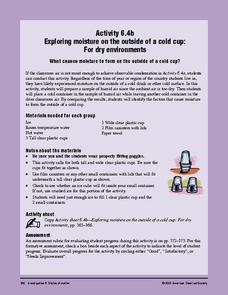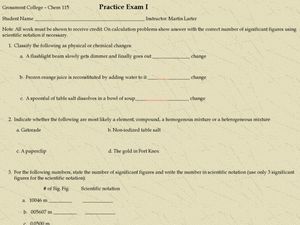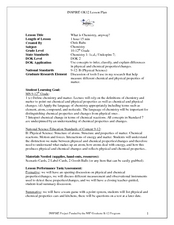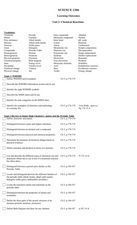Government of South Australia
Don't Waste Your Energy
Don't lift another finger, this physical and environmental science unit has everything you need to begin teaching your class about energy. Starting with a look at the greenhouse effect, these lessons and activities take young scientists...
American Chemical Society
Exploring Moisture on the Outside of a Cold Cup: For Dry Environments
If the area you live in is arid, or the preceding experiment in this unit didn't yield obvious results, use this one in place of it to help reveal where condensation comes from. The mini unit that this is part of a comprehensive...
Curated OER
Chemistry Basics Practice Exam
In this chemistry practice instructional activity, students solve sixteen problems including identifying chemical and physical changes, calculating numbers with significant figures, naming compounds and writing formulas and converting...
Santa Monica College
Single and Double Displacement Reactions
If you aren't part of the solution, you are part of the precipitate! Young chemists learn about single and double displacement reactions including precipitation reactions, neutralization reactions, and gas forming reactions. They perform...
Curated OER
What Is Chemistry, Anyway?
Students differentiate physical and chemical change. In this chemistry lesson, students list examples of those changes. They apply what they learned in a Jeopardy style team game.
Curated OER
Different Types of Changes (1.2)
In this recognizing different types of changes worksheet, students answer questions about such things as reversible change, irreversible process, climatic change, filtration process, physical change, and change in the state of a...
Curated OER
What's Happening in My World?
Students look for examples of chemical and physical changes in the world around them and complete "What's Happening in My World" worksheet.
Curated OER
Chemical Changes by Gems
Seventh graders observe that heat is produced when two substances are combined. They brainstorm how, and then experiment to find out which of two chemicals created the heat.
Curated OER
Breaking it Down
High schoolers will identify the factors that contribute to erosion and weathering. They will start by differentiating between chemical and mechanical weathering. They then apply what they learned by playing the online jeopardy game. Key...
Curated OER
Density Of A Material
Students determine the density of a material created in the laboratory and observe physical and chemical changes. They engage in a lab activity, and answer questions on a worksheet imbedded in this plan.
Curated OER
Chemistry - Science 10
In this chemistry science worksheet, students identify the parts of a chemical reactions. Students name the major particles of the atom. Students apply knowledge about the atom, theories, and models.
Curated OER
Describing Chemical Reactions
For this chemical reactions worksheet, learners fill in 12 blanks with the appropriate terms related to chemical reactions. They also indicate if 4 statements are true or false and match 7 words with their descriptions. Students complete...
Curated OER
Learning Outcomes
In this science worksheet, students explore the learning outcomes for a unit on chemical reactions. Students define 60 vocabulary words and answer a list of questions for each topic.
Mr. E. Science
An Introduction to Matter
What's the matter? Gas, solid, liquid, or plasma. The presentation covers how to describe and identify matter, changes in matter, types of matter, measuring matter, particles of matter, Democritus, and John Dalton's Atomic Theory.
Science Matters
Digestion: Chew on That
When your mom tells you to chew your food, you really should listen! A lesson on the digestive system examines the first step of digestion that happens in the mouth. Learners check crackers and use iodine to highlight changes in the...
Space Awareness
Fizzy Balloons - C02 in School
Carbon dioxide is a very important gas; it is present in the air, used in cooking, and supports plant and animal life. Scholars investigate the properties of carbon dioxide with three different activities. They experience a color change,...
Curated OER
Laboratory - Density of a Material
Students conduct a lab (with water, guar gum and sodium borate) and carefully record physical and chemical properties and changes throughout the session, and experiment with weighing by difference.
Curated OER
Matter and Change
In this matter and change worksheet, students answer 24 questions on topics such as elements, compounds, mixtures and chemical reactions. Students answer questions about the properties of matter such as their physical state and shape. In...
Curated OER
Describing the Physical World
In this physical world worksheet, students review concepts relating to the chemical and physical properties of matter, density of matter, and if matter is a solid, liquid, or gas. This worksheet has 9 terms in a word puzzle, 4 true or...
Curated OER
Science Jeopardy
Young scientists form teams and compete by providing questions for words and phrases related to science topics arranged in a Jeopardy quiz show game format. The categories include matter, measurement, vocabulary, and chemical or physical...
Curated OER
How Can we Measure the Rate of a Chemical Reaction?
Pupils examine different types of chemical reactions. They explore how alcohol molecules affect the reaction rates. They answer discussion questions to end the lesson.
Curated OER
Osmosis
Students investigate osmosis and diffusion in a liquid environment. In this osmosis lesson plan, students use dialysis tubing made into bags and filled with 3 different solutions. They observe the movement of water molecules into higher...
Curated OER
It's Alive! Using Microorganisms in Cooking
Learners create a KWL chart about food. In this chemistry lesson plan, students differentiate physical and chemical changes. They explain how microorganisms are used in food preparation.
Curated OER
Unit 1 Matter and Energy
Topping this worksheet is a comprehensive collection of notes about phase changes. The phase change graph is displayed, along with formulas for the gas laws, and information relating energy to change of phase. After reviewing these...























